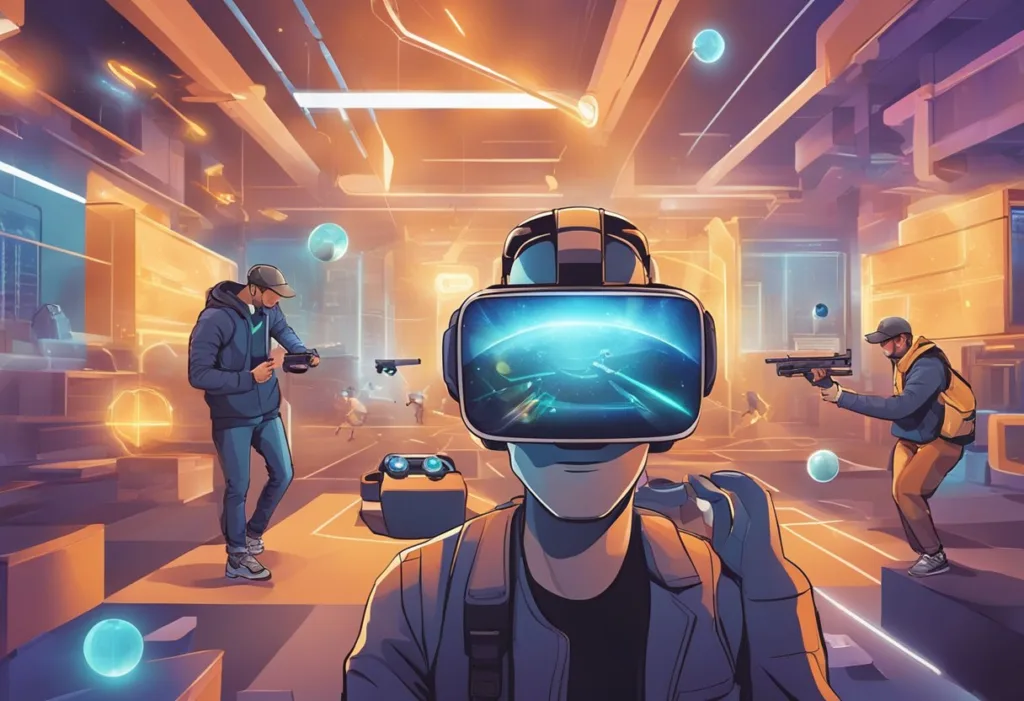Metaverse real estate is a new and rapidly growing market that involves buying and selling virtual land in the metaverse, which is a collective term for a variety of online platforms where people can connect, create, and invest. The metaverse is a virtual world that is created by combining virtual reality, augmented reality, and other immersive technologies. Investors are taking notice of the potential of metaverse real estate, and are snapping up virtual land in the hopes of profiting from the future growth of the market.
The concept of metaverse real estate is still relatively new, but it is already attracting significant attention from investors, businesses, and celebrities. The market is being driven by the growing popularity of virtual reality and other immersive technologies, as well as the increasing demand for unique and exclusive digital assets. Companies like Tokens.com and Metaverse Group are leading the way in this emerging market, and are already acquiring virtual land and other assets in the metaverse. As the market continues to grow, it is likely that we will see more businesses and investors entering the space, and more opportunities for growth and profit.
What is Metaverse Real Estate?
Metaverse real estate refers to virtual real estate or digital real estate. It is a type of property that exists within a virtual world, also known as the metaverse.
In the metaverse, parcels of land are sold, bought, and developed, just as in the real world. However, metaverse real estate is purely virtual, and the ownership of these virtual properties is secured using blockchain technology.
Metaverse Property Prices
Metaverse property prices vary depending on the virtual world and the location of the property. In some virtual worlds, the price of a parcel of land can range from a few dollars to thousands of dollars. The value of a property in the metaverse is determined by its location, size, and the demand for it.
How Does Real Estate in the Metaverse Work?
Real estate in the metaverse works similarly to real estate in the physical world. People can buy, sell, and develop virtual properties in the metaverse. The ownership of these virtual properties is secured using blockchain technology, which ensures that the ownership of the property is transparent and cannot be altered.
What Can You Do with Metaverse Real Estate?
Metaverse real estate can be used for various purposes. Some people buy virtual properties for investment purposes, hoping that the value of the property will increase over time. Others buy virtual properties to develop them into virtual businesses or communities. Virtual properties can also be used for gaming purposes, such as creating virtual arenas or stadiums.
Metaverse real estate is a rapidly growing industry that offers various opportunities for investment and development. The virtual world is expanding, and the demand for virtual properties is increasing. As technology advances, the virtual world is becoming more realistic, and the possibilities for metaverse real estate are endless.

Investing in Metaverse Real Estate
As virtual reality technology continues to advance, the concept of metaverse real estate has emerged as a viable investment opportunity. With virtual land and property becoming increasingly valuable, investors are looking to capitalize on this new market.
Types of Virtual Real Estate
Virtual real estate can take many forms, including virtual land, buildings, and other assets. Some of the most popular virtual real estate investments include virtual land in popular virtual worlds such as Decentraland and The Sandbox.
These virtual lands can be developed and monetized in a variety of ways, including through the sale of virtual goods and services or by renting out virtual space to other users.
Evaluating Virtual Property Value
Evaluating the value of virtual property can be challenging, as traditional real estate valuation methods may not always apply.
However, some factors that can impact the value of virtual property include location, accessibility, and the overall popularity of the virtual world in which the property is located. Investors may also want to consider the potential for future development and growth within the virtual world.
Risks and Considerations
As with any investment, there are risks associated with investing in metaverse real estate. One of the biggest risks is the potential for the virtual world in which the property is located to lose popularity or become obsolete.
Virtual property is not always protected by the same legal frameworks as physical property, which can make it more difficult to enforce ownership rights.
Investors should carefully evaluate the potential risks and rewards of investing in virtual real estate before making any investment decisions. However, for those willing to take on the risk, metaverse real estate can offer the potential for significant profits and returns.
The Business of Metaverse Properties

As the metaverse continues to expand, virtual real estate has become a significant business opportunity for investors and businesses. The concept of metaverse properties is similar to that of physical real estate, where virtual land is bought, sold, and developed for commercial or personal use.
Commercial Opportunities
Metaverse properties present a range of commercial opportunities for businesses. Companies can use virtual real estate to create unique and immersive experiences for their customers, such as virtual showrooms, events, and product launches. Virtual real estate can be used for advertising and brand partnerships.
Advertising and Brand Partnerships
Advertising and brand partnerships are two significant areas where metaverse properties can be leveraged. Brands such as Adidas, Gucci, and Samsung have already invested in virtual real estate to create virtual storefronts and immersive experiences for their customers. Virtual real estate can be used for product placement, sponsorships, and collaborations with other brands.
Digital Storefronts and Commerce
Metaverse properties can also be used for digital storefronts and commerce. Virtual storefronts can be used to sell digital products, such as NFTs, digital art, and virtual goods. Virtual real estate can be used for e-commerce, where customers can purchase physical products that are delivered to their physical location.
Metaverse properties have become a significant business opportunity for investors and businesses alike. As the metaverse continues to expand, virtual real estate is likely to become an essential part of the digital economy.
Cultural and Social Impact of Metaverse Real Estate
The metaverse has the potential to significantly impact culture and society. As virtual worlds become more prevalent, they create new opportunities for people to connect, express themselves, and engage in entertainment and gaming.
This section explores the cultural and social impact of the metaverse, focusing on its effects on virtual communities, entertainment and gaming, and digital identity and expression.
Virtual Communities
One of the most significant impacts of the metaverse is the creation of virtual communities. These communities are formed by people who share common interests and engage in activities in virtual worlds. They provide a space for people to connect with others who share their passions, regardless of their physical location.
The metaverse has the potential to create more inclusive communities, as people from all over the world can come together in virtual spaces. However, it’s important to ensure that these communities are safe and welcoming for everyone. Designers and developers must take steps to prevent harassment and create spaces that are accessible to all.
Entertainment and Gaming
Entertainment and gaming are two of the main drivers of the metaverse. Virtual worlds provide new opportunities for people to engage in these activities, offering immersive experiences that are not possible in the physical world.
The metaverse has already had a significant impact on the gaming industry. Platforms like Roblox allow users to create and share their own games, democratizing game development and providing new opportunities for independent creators.
Digital Identity and Expression
The metaverse also has the potential to impact digital identity and expression. In virtual worlds, people can create avatars that represent themselves in any way they choose. This allows for greater self-expression and creativity, but it also raises questions about identity and authenticity.
Celebrities like Snoop Dogg have already started to explore the potential of the metaverse for digital identity and expression. Snoop Dogg has created his own avatar and performed virtual concerts in virtual worlds, showcasing the potential for the metaverse to blur the lines between the physical and digital worlds.
The cultural and social impact of the metaverse is significant, with the potential to create new opportunities for connection, expression, and entertainment. However, it’s important to ensure that these opportunities are accessible to everyone and that virtual communities are safe and welcoming for all.

Legal and Ownership Aspects
Property Rights in Virtual Land
Virtual land is a unique asset that has no physical existence. Therefore, the concept of ownership and property rights in virtual land is still in its infancy. However, the use of blockchain technology has made it possible to create a decentralized system for managing virtual land ownership.
In the metaverse, virtual land is typically sold as non-fungible tokens (NFTs) on the Ethereum blockchain. NFTs are unique digital assets that can be bought and sold like any other asset. When someone buys an NFT, they are purchasing a digital certificate of ownership that verifies their ownership of the underlying asset.
Cryptocurrency Transactions
Cryptocurrency transactions are an essential part of buying and selling virtual land in the metaverse. Ethereum is the most commonly used cryptocurrency for buying and selling NFTs. However, Bitcoin and other cryptocurrencies can also be used for these transactions.
When someone buys an NFT, they typically use cryptocurrency to make the purchase. The transaction is then recorded on the blockchain, which verifies the transfer of ownership of the NFT from the seller to the buyer.
Regulatory Landscape
The regulatory landscape for virtual land ownership is still developing. Governments around the world are grappling with how to regulate these new assets.
In the United States, the Securities and Exchange Commission (SEC) has indicated that some NFTs may be considered securities and subject to regulation. However, the SEC has not yet issued clear guidelines on how it intends to regulate these assets.
The legal and ownership aspects of virtual land in the metaverse are still evolving. However, the use of blockchain technology and NFTs has made it possible to create a decentralized system for managing virtual land ownership. As the regulatory landscape continues to develop, it will be interesting to see how governments around the world respond to these new assets.
Frequently Asked Questions
How is virtual real estate valued in the metaverse?
The value of virtual real estate in the metaverse is determined by various factors such as location, size, accessibility, and demand. The value of a virtual property can be influenced by the number of users who visit the area, the popularity of the virtual location, and the type of content that is available in the area.
What are the risks associated with investing in metaverse real estate?
As with any investment, there are risks associated with investing in metaverse real estate. One of the primary risks is the uncertainty of the market and the potential for fluctuations in the value of virtual properties. There may be regulatory and legal issues that could impact the value of virtual real estate.
Which companies are leading the development of real estate in the metaverse?
Several companies are leading the development of real estate in the metaverse, including Decentraland, The Sandbox, Somnium Space, and Cryptovoxels. These companies are creating virtual worlds and environments that allow users to buy, sell, and develop virtual properties.
What are the potential returns on investment in metaverse properties?
The potential returns on investment in metaverse properties can vary widely depending on the location, size, and demand for the virtual property. Some virtual properties have sold for millions of dollars, while others have sold for much less. It is important to do thorough research and due diligence before investing in virtual real estate.
How much does a house cost in metaverse?
The cost of a virtual house in the metaverse can vary widely depending on the location, size, and demand for the property. Some virtual properties have sold for tens of thousands of dollars, while others have sold for much less. It is important to research the market and understand the potential risks and rewards before investing in virtual real estate.
What happened to metaverse real estate?
Metaverse real estate is a growing market that has seen significant growth in recent years. As more users enter virtual worlds and environments, the demand for virtual real estate is expected to continue to grow. However, like any market, there may be fluctuations and changes in the value of virtual properties.
What is a metaverse real estate?
Metaverse real estate refers to virtual properties that exist in virtual worlds and environments. These virtual properties can include anything from virtual houses and buildings to virtual land and spaces. Users can buy, sell, and develop virtual properties in the metaverse.
How much do metaverse real estate agents make?
The compensation for metaverse real estate agents can vary widely depending on the company they work for and the type of virtual properties they sell. Some agents may earn a commission on the sale of virtual properties, while others may earn a salary or hourly wage. It is important to research the compensation structure before pursuing a career as a metaverse real estate agent.














